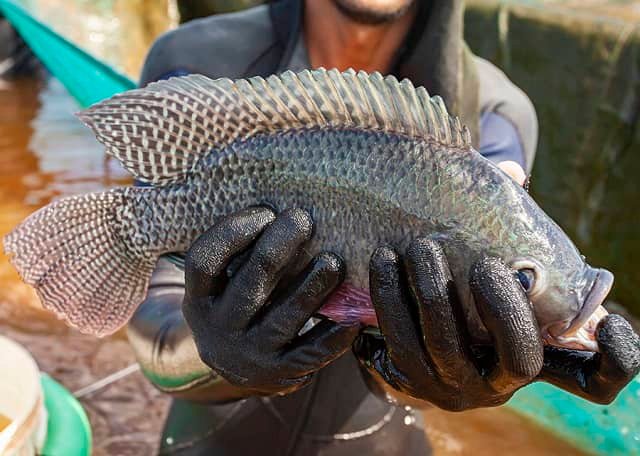
There is a growing interest in strategies to manipulate the intestinal microbiota of fish so that beneficial microbial communities can enhance growth, improve lipid metabolism, stimulate immune responses, and enhance the physiological state of the intestine.
In this regard, a team of scientists from the Universidade Federal de São Carlos (UFSCar), the Universidade Estadual de Campinas (Unicamp), and Embrapa Meio Ambiente (SP) concluded that a diet containing an extract of the “Sweet Wormwood” plant Artemisia annua for Nile tilapia (Oreochromis niloticus) modified the intestinal microbiota of the fish, promoting greater weight gain and improving their immunity.
The research paves the way for the formulation of fish feed using the plant as an ingredient, thus offering the sector a new bioproduct.
Originally from temperate regions of Asia, Sweet Wormwood can be found worldwide.
Strategies for manipulating the microbiota
There is a growing interest in strategies to manipulate the intestinal microbiota of fish and provide a beneficial community to enhance growth, improve lipid metabolism, stimulate immune responses, and improve the physiological state of tilapia.
Phytochemical substances, such as Artemisia extract, are natural compounds considered ideal as growth promoters while improving intestinal morphology, ensuring greater production efficiency.
According to Michelly Soares, a postdoctoral researcher at UFSCar, among phytogenic additives, Artemisia annua stands out for its use in animal production, improving growth performance, intestinal morphology, and antioxidant capacity in broiler chickens and weaned piglets.
For fish, the extract from the Sweet Wormwood plant showed considerable potential as a growth promoter for carp and trout farming.
Benefits
The researchers report that the potential benefits of Sweet Wormwood supplementation in Nile tilapia during the 30-day experiment were evident. Soares explains that the plant extract modified the intestinal microbial communities, resulting in a more efficient community and promoting alterations in morphology, providing better feed conversion and protein efficiency, leading to weight gain and growth.
For farmed fish, feeding is vital in shaping the gastrointestinal microbiome, and its diversity is reflected in weight gain, immune development, pathogen inhibition, and various host metabolic activities.
Bioactive compounds from plants can modulate the microbiota of the intestinal tract while promoting the growth of beneficial bacteria. In addition to these effects, microbiome modulation inhibits the growth of pathogenic bacteria.
According to the researchers, different amounts of Sweet Wormwood caused variations in specific bacterial abundance. The abundance of bacteria belonging to Fusobacteriaceae, Stenotrophomonas, and Clostridium positively correlated with protein efficiency, specific growth rate, weight gain, and final weight, while the opposite was observed for Acinetobacter.
“Likewise, we suggest that supplementation with Artemisia annua, in addition to acting as a microbiota modulator, also plays a role in the renewal and maturation of the intestinal epithelium, in that it promotes an increase in the height, perimeter, thickness, and villus-crypt ratio in the intestines of tilapia. Both are related to the effect of Artemisia supplementation, which improved the growth performance of Nile tilapia,” reported Fernanda Sampaio, Embrapa researcher.
Embrapa researcher Claudio Jonsson explains that the intestine is primarily responsible for digestion and absorption in fish. Consequently, it also contributes to healthy growth.
Jonsson explains that alterations in intestinal morphology, such as longer villi and increased villus perimeter, indicate a greater capacity for nutrient absorption and a better mechanical barrier in fish intestines.
“Diets supplemented with 0.25% and 0.5% Artemisia annua increased the perimeter, height, and thickness of villi, crypt depth, villus-crypt ratio, and the number of goblet cells in the intestines of Nile tilapia compared to the control group,” report the researchers.
Supplementation with Artemisia annua also provided more efficient energy utilization from the feed.
Conclusion
“Nile tilapia supplemented with Artemisia annua at all levels improved growth performance and feed conversion rate compared to the control group. Weight gain was approximately 21% better in fish supplemented with Artemisia than in non-supplemented fish,” they concluded.
Furthermore, Artemisia annua supplementation in Nile tilapia for 30 days modulated the GI microbiota communities, resulting in variations in specific bacterial abundance, affecting bacterial interactions, and leading to a more complex, stable, and interconnected network while changing their intestinal morphology and improving fish performance.
The study was funded by the “BRS Aqua” project, a collaboration between the Brazilian Development Bank, Embrapa, and the Ministry of Agriculture, Livestock, and Food Supply, with the support of the National Council for Scientific and Technological Development and the Eliseu Alves Foundation.
Reference
Michelly Pereira Soares, Israel Luz Cardoso, Fabrício Eugênio Araújo, Carolina Fernandes De Angelis, Rodrigo Mendes, Lucas William Mendes, Marisa Narciso Fernandes, Claudio Martin Jonsson, Sonia Claudia do Nascimento de Queiroz, Marta Cristina Teixeira Duarte, Francisco Tadeu Rantin, Fernanda Garcia Sampaio,
Influences of the alcoholic extract of Artemisia annua on gastrointestinal microbiota and performance of Nile tilapia. Aquaculture, Volume 560, 2022, 738521, ISSN 0044-8486, https://doi.org/10.1016/j.aquaculture.2022.738521.
Editor at the digital magazine AquaHoy. He holds a degree in Aquaculture Biology from the National University of Santa (UNS) and a Master’s degree in Science and Innovation Management from the Polytechnic University of Valencia, with postgraduate diplomas in Business Innovation and Innovation Management. He possesses extensive experience in the aquaculture and fisheries sector, having led the Fisheries Innovation Unit of the National Program for Innovation in Fisheries and Aquaculture (PNIPA). He has served as a senior consultant in technology watch, an innovation project formulator and advisor, and a lecturer at UNS. He is a member of the Peruvian College of Biologists and was recognized by the World Aquaculture Society (WAS) in 2016 for his contribution to aquaculture.
